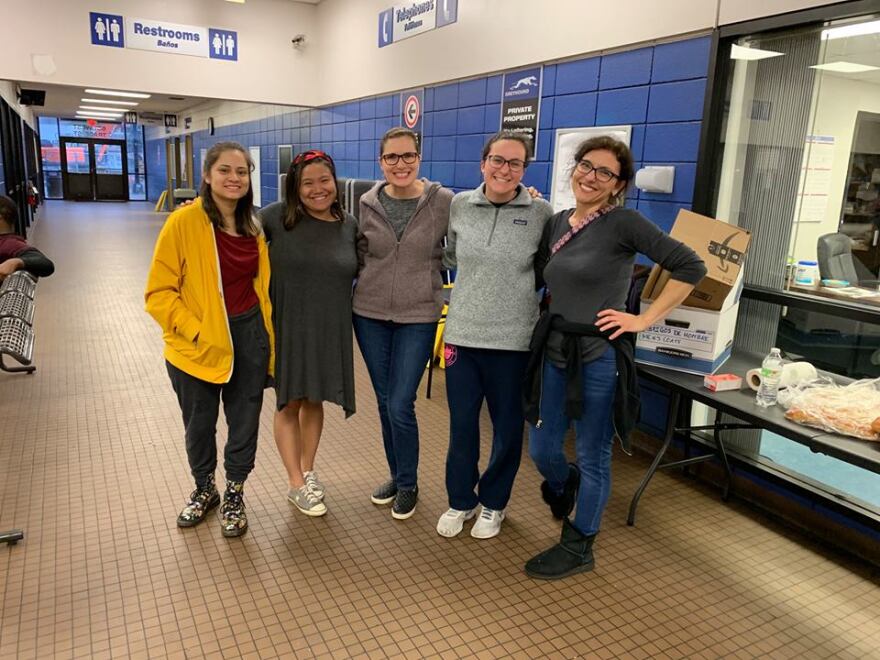Nikola Taylor was only 8 when her family fled Poland in 1982. Her father was involved in a political movement in opposition to the government, which made staying in their home country dangerous.
She says moving to a new country as a child without knowing the language fostered her passion for helping out other immigrants. In particular, she has a passion for helping immigrants from Latin America who had to leave their countries and seek asylum in the United States.
“The idea that your country is no longer safe for you and your family, that your parents might be in danger for protesting,” Taylor said. “Also just a very impoverished country, decimated by the results of government decisions that really bonded me to the people of Central America.”
It was this bond that Taylor says made her want to help out the Latino immigrant community despite not speaking Spanish.
“I still can communicate with people pretty easily,” Taylor said. “Because you can understand grief and loss and things like that that people have gone through. And everything else can be just done through Google Translate.”
In 2018, she started volunteering for Charlotte’s Southeast Asian Coalition in a program that provided immigrants with food and clothing at bus stops as they traveled from detention centers in Texas up the East Coast.
Within a few weeks, Taylor says, she and her colleague Marsha Kelly decided to take over the program and launch what is now known as the Mis Amigos Project. The group continued its work having volunteers at bus stations as seven buses arrived every day of the week.
“What we were doing is just a warm greeting to the people coming through the station,” Taylor said.
Volunteers held up signs and gave the migrants food, water and supplies. Taylor says sometimes she helped explain the bus tickets to the migrants and called their family members who were in other states to tell them when their relatives would be arriving.

“The thing that got me was just basically thinking about myself and my family and how we came to the United States,” Taylor said. “And how people helped us and just wanting these folks to know that they are welcome in the United States.”
At their peak, Taylor says, there were several hundred volunteers going to bus stops every day to support a total of around 11,000 immigrants.
“It feels good to be a part of something where you see the best of humanity,” Taylor said. “You see people helping each other and across language barriers, across all kinds of barriers, making friends with each other.”
But that quickly changed in 2019 when former President Trump implemented the Migrant Protection Protocols program, also known as the “Remain in Mexico” policy. Under this order, immigrants seeking asylum were required to remain in Mexico while they awaited legal proceedings.
With the new policy, immigrants were no longer traveling to the bus stops as they once did.
“We saw what a federal policy can do on a very small scale here in our little town of Charlotte,” Taylor said. “Just devastating to see that all those folks we saw and met and and loved on were no longer able to come through.”
As the group was reevaluating how to best support the immigrant community, the coronavirus pandemic hit. Mis Amigos Project launched a COVID-19 hotline and had five Spanish-speaking operators helping callers with their needs. Taylor says the hotline helped around 450 callers.
A lack of volunteers has led the group to close down its hotline, but an online resource guide remains available on the Mis Amigos Project Facebook group. Taylor says some volunteers still support immigrants by driving them to doctor's appointments and helping them furnish their homes.
“We have so many amazing volunteers that have given so much to this group,” Taylor said. “And and again, I'm just really touched by the connections they've made with the families themselves.”
In February, following an executive order from President Biden, the Department of Homeland Security began to bring immigrants who were in Mexico due to the Migrant Protection Protocols policy to the United States while their asylum cases were heard.
Between then and May, more than 10,000 individuals who were previously forced to remain in Mexico were able to enter the United States, according to the Transactional Records Access Clearinghouse at Syracuse University. Nearly 300 of these cases ended up in Charlotte.

Taylor says the Mis Amigos Project started going back to bus stops. However, she says, with the pandemic, finding volunteers who are willing to meet the immigrants in person has been a struggle. But she says many of them are still trying to find other ways to help out.
“One of our volunteers, who feels like he's too old to come out to the station because of his health and his age, he sent me most of his stimulus check. Just for this group,” Taylor said.
In August, the U.S. Supreme Court issued a ruling requiring the Biden administration to comply with a lower court’s decision mandating the government to reinstate the remain in Mexico program.
Since then, Taylor says, the number of immigrants passing through North Carolina in buses has declined. She says the group is coming up with ways to support immigrants already living in Charlotte.
Taylor says she wants to continue giving back to the immigrant community in the same way her family was supported nearly 40 years ago.
“It's very healing, I would say anybody who is an immigrant child will tell you that that kind of always stays with them,” Taylor said.


